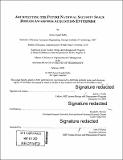Architecturing the future national security space domain awareness acquisition enterprise
Author(s)
Kelly, Aaron Joseph (Researcher in engineering and management).
Download1341997754-MIT.pdf (97.95Mb)
Other Contributors
Massachusetts Institute of Technology. Engineering Systems Division.
System Design and Management Program.
Advisor
Donna H. Rhodes.
Terms of use
Metadata
Show full item recordAbstract
Space-based capabilities are increasingly critical to prosperity in the United States (US) and around the globe. They are deeply embedded within society's vital functions and even more tightly intertwined with US national security capabilities across all warfighting domains. The disruption to these capabilities severely diminishes US warfighting capability. Space Domain Awareness (SDA) systems provides space environment and activity information to decisionmakers to enable action. These systems are prerequisite for the defense of US space capabilities. Adversaries see US dependence on space as an attractive target and are rapidly developing capabilities to deny US access to these systems at the time the nation would need them most. These threatening capabilities are eroding the longstanding US technological advantage in space. The US must react with capability development efforts that outpace the threat, but acquisitions have been stymied by a fragmented enterprise, risk adversity, burdensome acquisition processes, and oversight requirements that delay capability delivery, including SDA capabilities. Concurrently, staggering growth in commercial space activity is making the space environment more congested and increasing difficulty of the SDA mission. Fortunately, commercial capabilities that can support the NSS SDA acquisition enterprise have also evolved. This thesis reasons a systems approach to architecting the NSS SDA acquisition enterprise provides architecture concepts that position the enterprise to overcome these issues and maintain its technological lead over adversaries. The thesis applies the Architecting Innovative Enterprise Strategy (ARIES) Framework as the systems architecting context to understand and address the enterprise's complexity. The ARIES process model and view elements logically transform data from research into a comprehensible description of the current architecture and a holistic vision of the desired future state. Finally, it guides the process of generating and suggesting an architecture concept that delivers the quality, interoperability, responsiveness, reliability, transparency, scalability, evolvability, and affordability necessary to meet warfighter needs. The concept focuses on delivering analysis and ingestion software capabilities that maximize the enterprise's ability to leverage external SDA data sources. Incorporation of that data enables the enterprise to prioritize acquisition of NSS-specific capabilities: those that track and characterize space objects.
Description
Thesis: S.M. in Engineering and Management, Massachusetts Institute of Technology, Engineering Systems Division, System Design and Management Program, 2020 Cataloged from PDF version of thesis. Includes bibliographical references (pages 178-184).
Date issued
2020Department
Massachusetts Institute of Technology. Engineering Systems Division; System Design and Management Program.Publisher
Massachusetts Institute of Technology
Keywords
Engineering Systems Division., System Design and Management Program.